
Reedsy's editorial team is a diverse group of industry experts devoted to helping authors write and publish beautiful books.
Editor-in-Chief of the Reedsy blog, Dario is a graduate of Mälardalen University. As a freelance writer, he has written for many esteemed outlets aimed at writers. A traveler at heart, he can be found roaming the world and working from his laptop.
No matter what level of experience you have as an author, you can always use a little help to get your manuscript off the ground. Book writing templates are tools that authors can leverage to fuel their progress: from brainstorming characters, to worldbuilding, to structuring a story, templates can help you make sure you start off on the right foot.
The goal of using a template is not to make cookie-cutter novels, but rather to better shape your book idea into a unique story. If you’re keen to receive a little help, here are 10 different types of book writing templates you can use to sketch out your stories.
Want to finish your novel in just 3 months? Sign up for our How to Write a Novel course.

NEW REEDSY COURSE
How to Write a Novel
Enroll in our course and become an author in three months.
Sign up below to receive all ten book writing templates featured in this post (or continue reading to download individual templates).
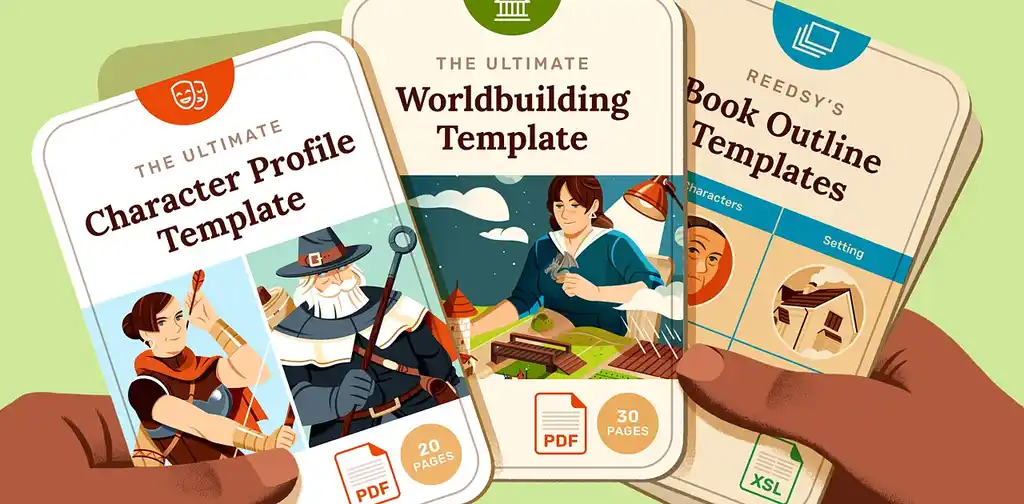
The Top 10 Book Writing Templates
Use these to develop your characters, outline your plot, and write your book.
Or if you'd like to build your story directly in a writing app, we recommend using the free Reedsy Studio. Simply create your account with one click below and start outlining with the pre-made story templates — right away!
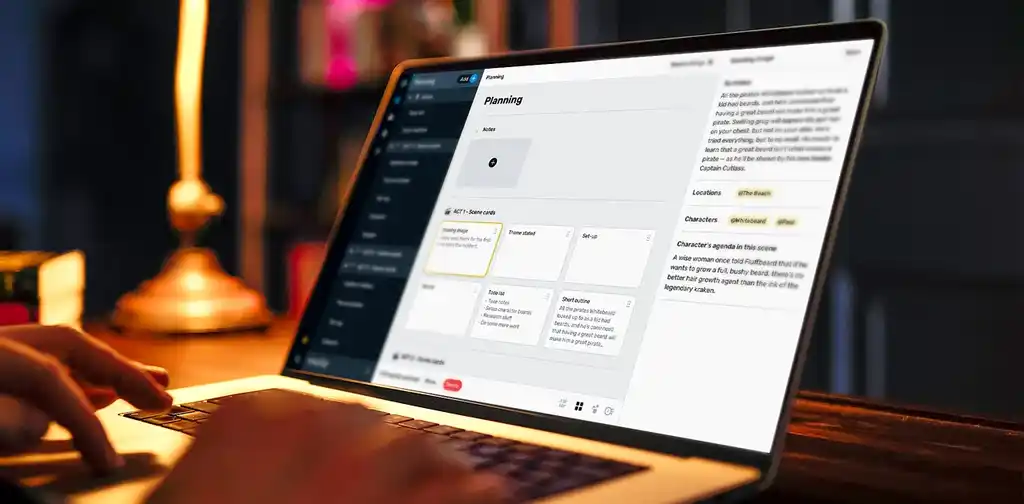
FREE OUTLINING APP
Use the Boards feature to plan, organize, or research anything.
The most fundamental type of book template concerns concept development. Think of book ideas as seeds: not all of them have the potential to become a great big oak — but some do.
To help you determine if your idea is 'fertile' enough, we've made a book development template designed to test the waters.
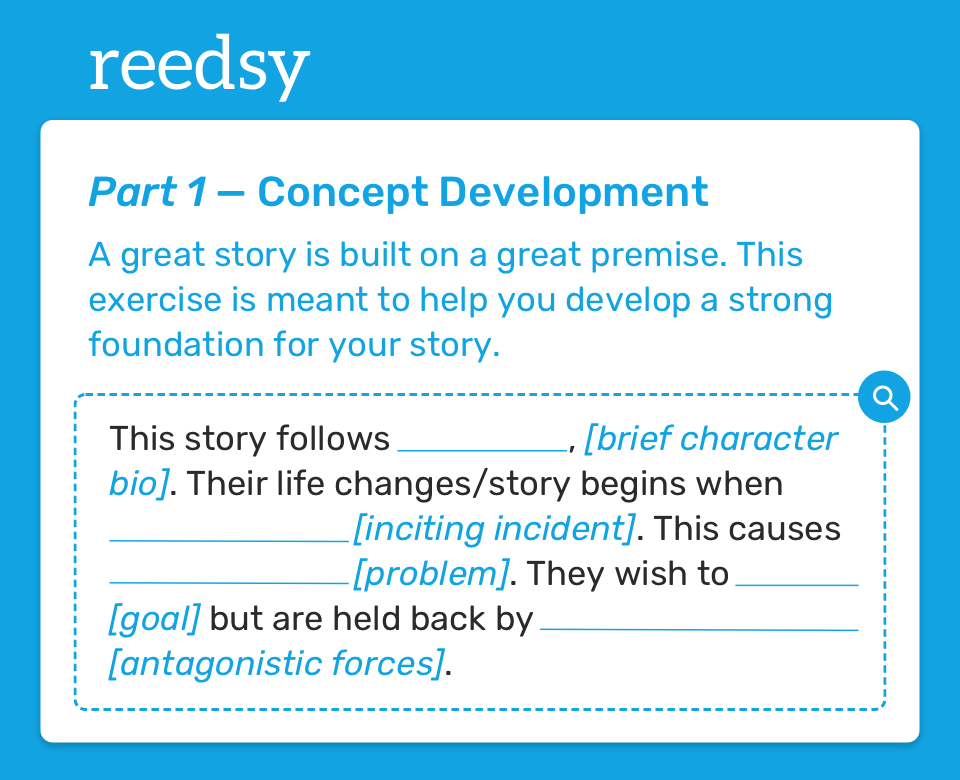
Our seven-part book development template will guide you step-by-step in nailing down your protagonist, supporting characters, antagonists, as well as your worldbuilding and plot structure. If that wasn’t enough, it will also help you pick your voice and perspective.
In other words, it will help you germinate that idea into a sapling that will eventually become your first draft. To download this specific template, insert your email below — or sign up above to receive all templates.

Get our Book Development Template
Use this template to go from a vague idea to a solid plan for a first draft.
Once you have a great story idea, you need to actually put it down on paper (or in a book editor, but paper sounds better, doesn’t it?). Many authors write when inspiration strikes, following their intuition for chapters on end without a plan. While this approach might be powerful to get things going, it can be useful to think about how you'll structure your story early on in the writing process to avoid running into plot holes and writing yourself into a corner.
Luckily, in literature there are a few common story structures every author can refer to when plotting, starting with the most popular of them all 一 the Three-Act structure.
Originally defined by Aristotle two thousands years ago, the Three-Act structure divides a story in a beginning, middle, and end. This method is one of the most commonly used when plotting novels, as it provides a basic skeleton for your story that ensures all your plot points are in place, building tension and stakes until the climax and resolution.
To download this specific template, insert your email below — or sign up above to receive all templates.
Effortlessly plot your story with our customizable template. Enter your email, and we'll send it to you right away.
By dissecting the story in three parts of equal importance, you’ll be able to create a strong narrative that keeps readers hooked from start to finish. You can print out the template or edit it online 一 for each section you’ll be asked to write a synopsis of what happens in the story, and a specific example of it.
Another, more hands-on take on the Three-Act structure is the Hero’s Journey, which focuses on the transformation of a single protagonist. Divided in twelve distinct phases, it helps you deconstruct your protagonist's journey, from the initial call to adventure to the return home as a changed person.
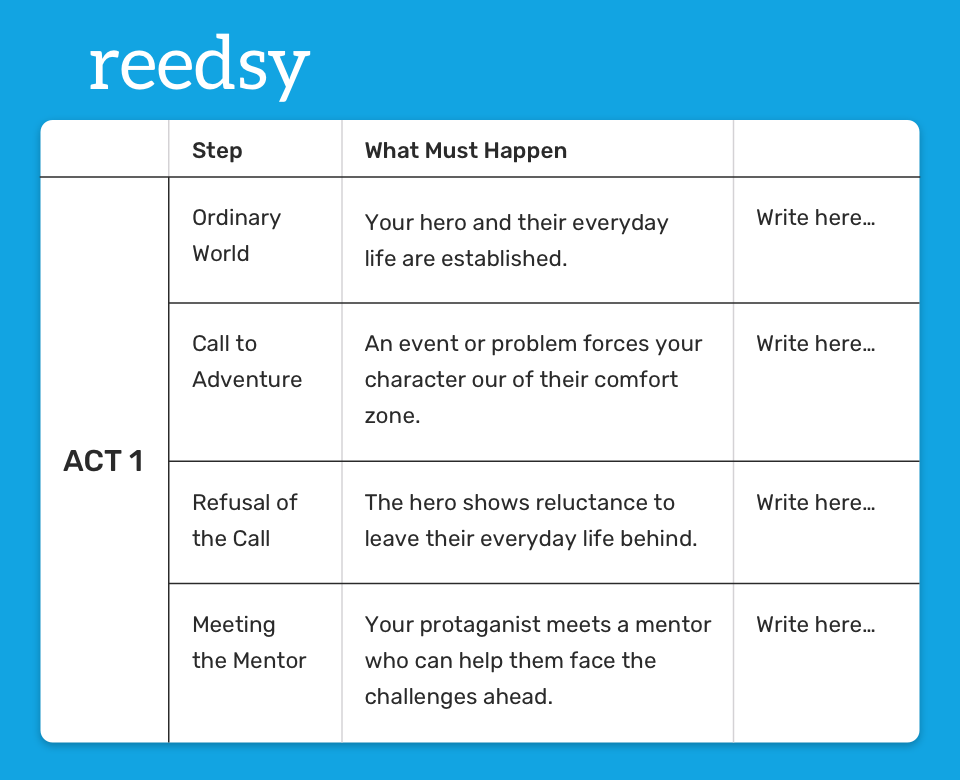
Our template will help you write down a short synopsis about important story elements, such as:
These timeless elements have been used in countless stories, from Biblical tales to Star Wars, and will give you creative freedom while ensuring your narrative stays on track. To download this specific template, insert your email below — or sign up above to receive all templates.
Effortlessly plot your story with our customizable template. Enter your email, and we'll send it to you right away.
If you have trouble figuring out your list of scenes, you can get more granular with the Save the Cat template, which tells you exactly what should happen on what page. Originally developed for screenwriters, it has been widely adopted by novelists to plan their stories with theme, character development, and pacing in mind.
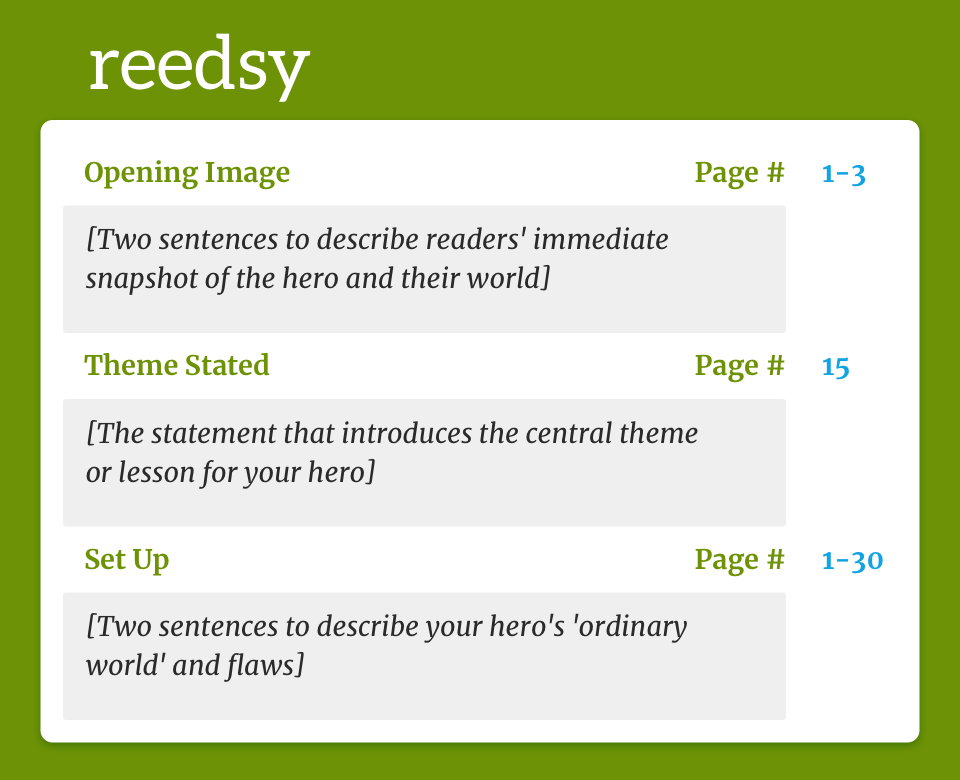
The Save the Cat template builds upon the classic Three-Act structure, but further dividing a story into 15 beats that tell you when the inciting accident, subplots, and other key elements should happen. In our template, you can simply enter your target word count and it'll tell you exactly when and for how long each beat should last, so that your story doesn't lag in places where it should be motoring along.
To download this specific template, insert your email below — or sign up above to receive all templates.
You’ll get it in your email inbox right afterward.
Once you have defined your larger story structure and developed your idea, you can use a book template to go in scene by scene and keep track of the main plot and subplots, and how they fit into your book’s overall timeline.
Save it in your Google Sheets, edit it, move scenes around, and tweak it until you’re satisfied with the narrative flow.
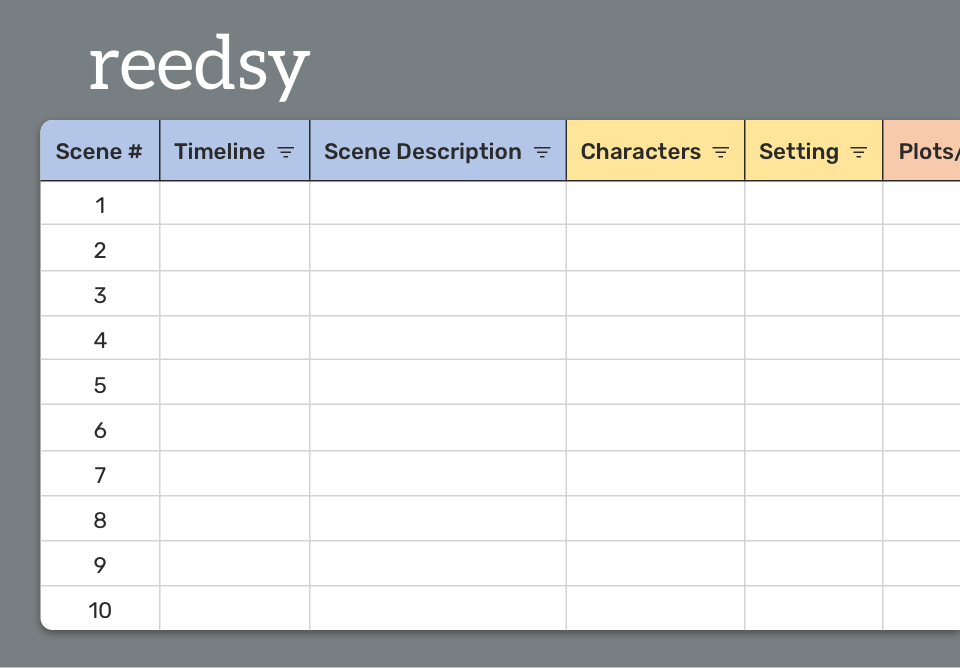
Depending on your preference, our book outline templates includes three exercises that can help you create:
To download this specific template, insert your email below — or sign up above to receive all templates.
You'll get it in your email inbox right afterward.
Apart from large-picture templates, some templates can help with specific aspects of your stories, like creating a fictional world from scratch 一 from your world’s history, to geography, to technology and more.
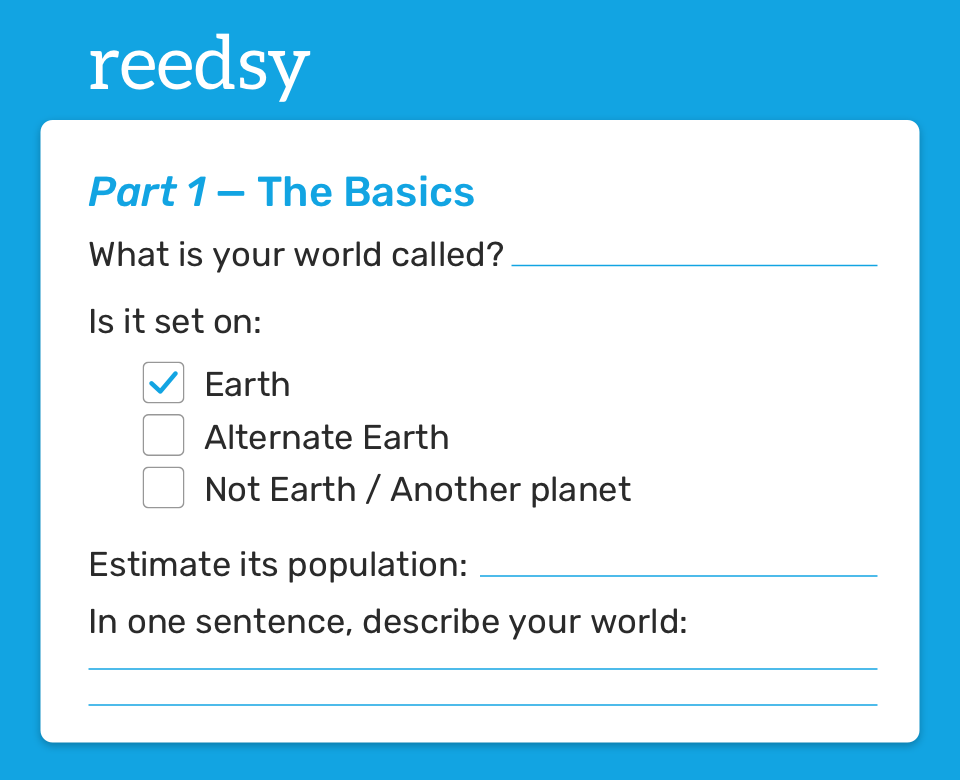
If you’re a fantasy or sci-fi writer, or you simply want to go deep with your creating your story's world, use our 7-part template to establish aspects such as:
If you struggle to piece together all of your world’s features, this template is for you 一 print it out and spend some time with it. This will help you map the environment to the point where it feels like a real place, and you can better communicate it to your readers. To download this specific template, insert your email below — or sign up above to receive all templates.

The Ultimate Worldbuilding Template
130 questions to help create a world readers want to visit again and again.
Since characters are the heart of any story, it’s important to sculpt them to the smallest detail. To help you create remarkable characters, we made two separate templates: one to thoroughly define who they are, and one to test their boundaries in hypothetical scenarios.
Similarly to building a world from scratch, developing an identity is not an easy task. After all, think about yourself: how long did it take you to become the person you are today? As many years as you’re old. So, how do you replicate that same process not just for one, but multiple protagonists 一 so that they feel like someone you could bump into in real life? Well, you can start by creating a detailed profile.
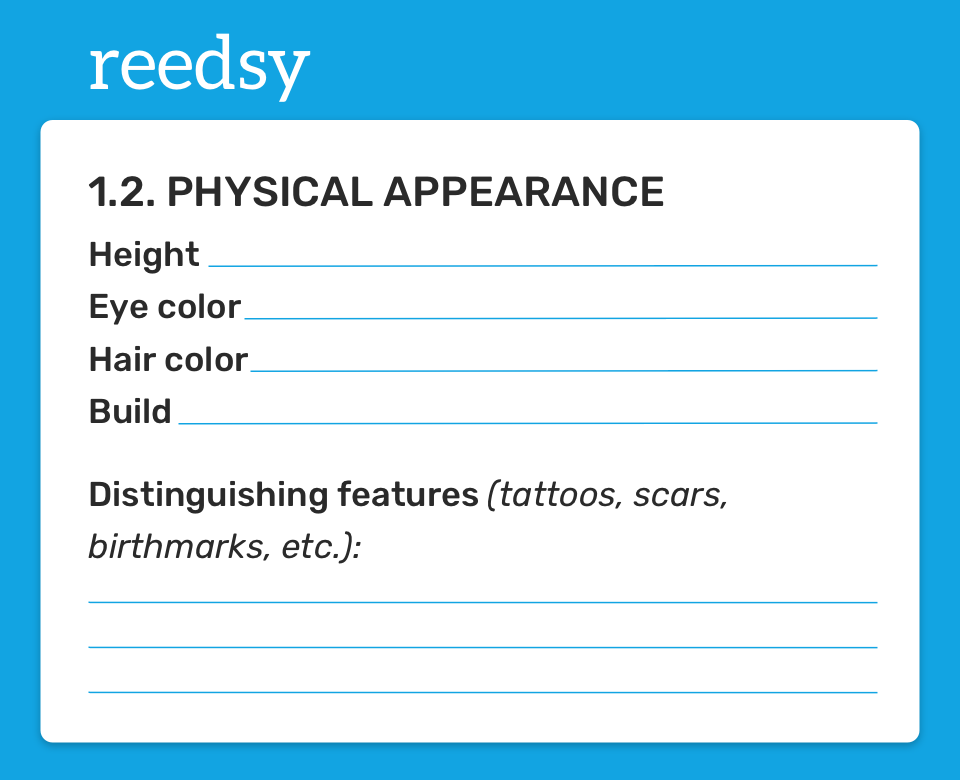
For each major character in your novel, you can print and fill out our character profile template. It will guide you step-by-step in detailing your character’s features, such as:
The template may start with superficial traits such as appearances, but then it urges you to also look beneath the skin. So, take the time to ponder over each of the sections to give yourself the chance to create truly compelling characters that readers will resonate with.
To download this specific template, insert your email below — or sign up above to receive all templates.
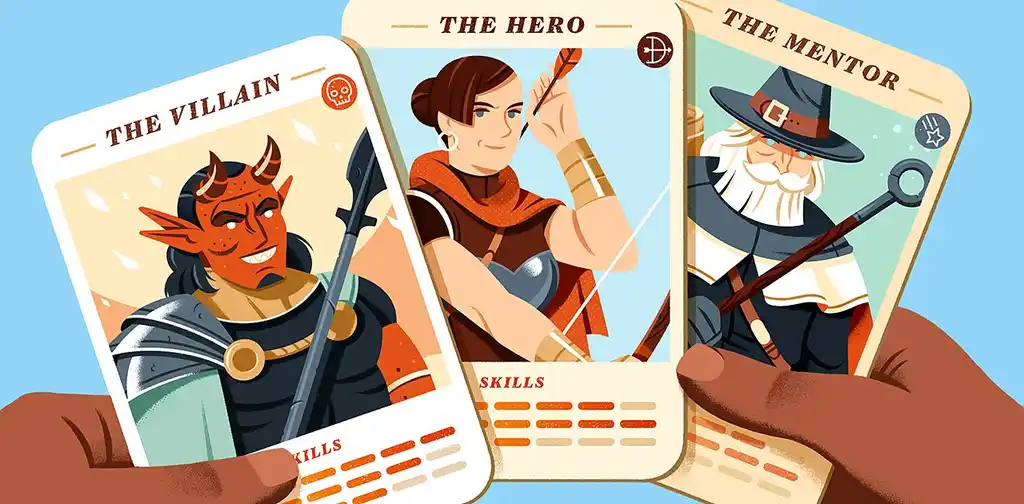
Reedsy’s Character Profile Template
A story is only as strong as its characters. Fill this out to develop yours.
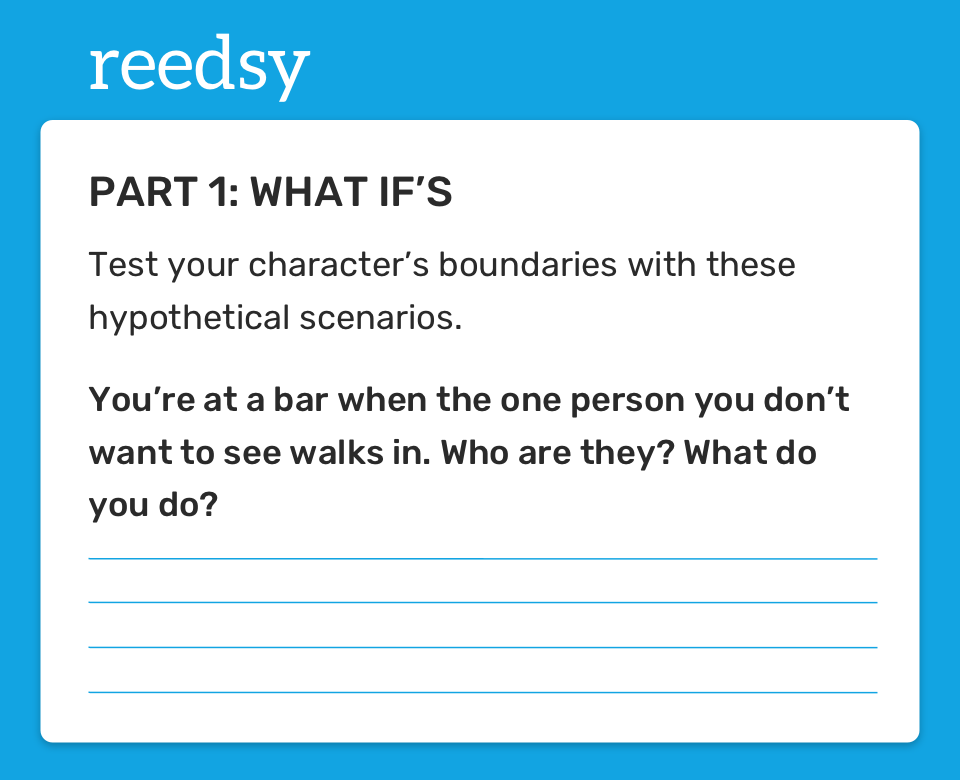
Once you have your multi-dimensional character, a fun exercise is to test how they would respond in different situations. For example, what would they do if a person they don’t want to see walks into the bar they’re at? Or what if they won the lottery? You will be surprised at how much you can learn about your character this way, and even if these situations may not feature in your book, your deep understanding of your character will translate into your writing.
To download this specific template, insert your email below — or sign up above to receive all templates.

Reedsy’s Character Questionnaire
40 questions to help you develop memorable characters.
Not all book templates concern the writing aspect of authorship. Some are just useful to format your manuscript in a way that adheres to industry standards before you send out your query letters.
While content matters more than how it’s presented, publishing professionals still expect you to present a professionally formatted manuscript. To help you not stand out for the wrong reason, you can use Reedsy’s manuscript format template.
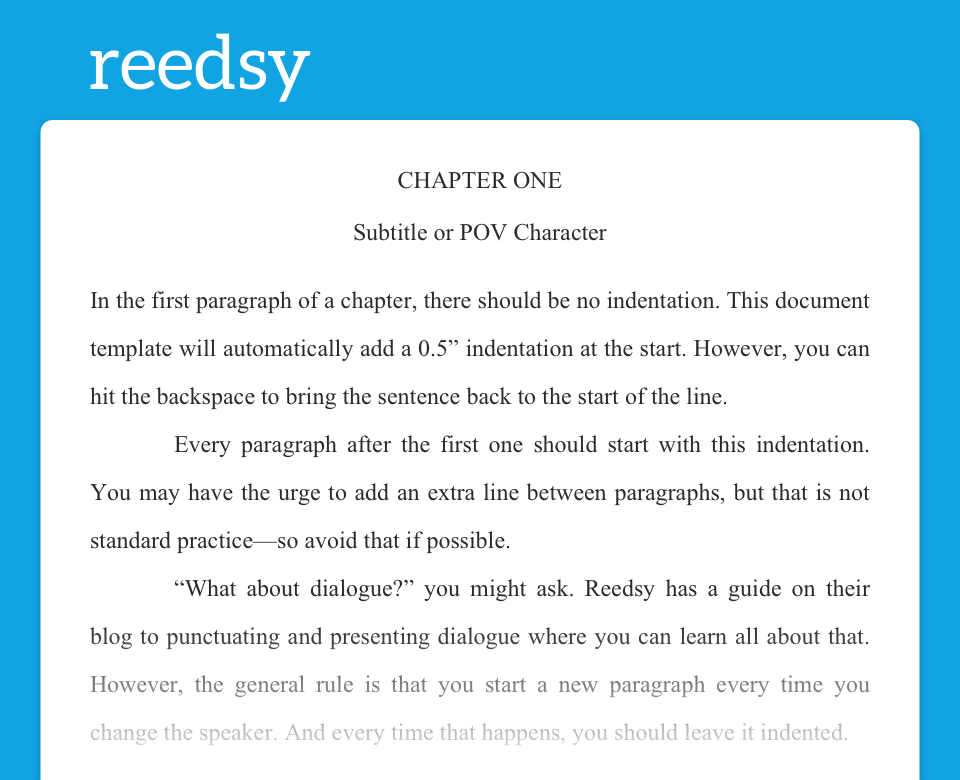
You just need to download a copy and edit it, either by writing directly in it, or copy-pasting (without formatting) the content of your novel. Again, if you want to download this specific template, insert your email below — or sign up above to receive all templates.
Alternatively, you could format your manuscript with one of the three free book templates available in Reedsy Studio.
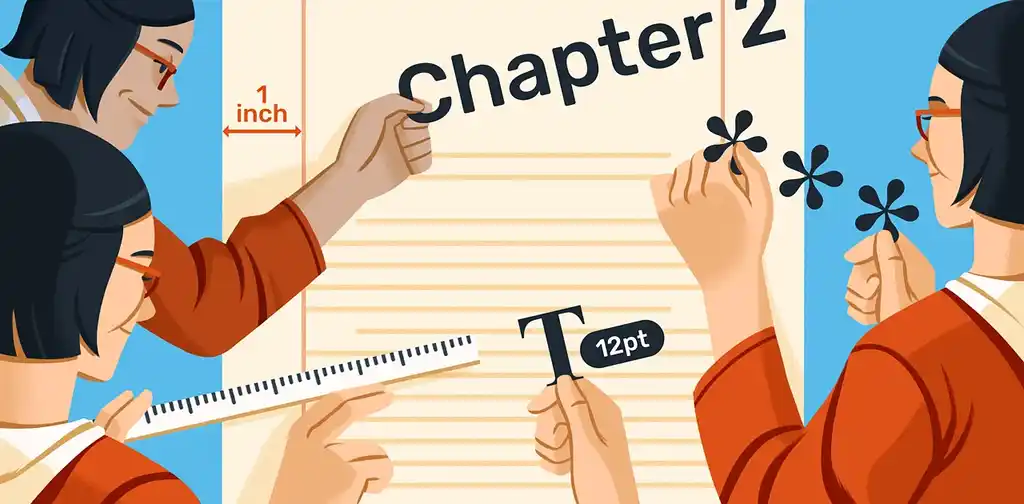
Manuscript Format Template
Get your manuscript ready for submission to agents and publishers.
If you’re writing a children’s book, there are slightly different formatting rules you need to be aware of 一 for example if you’re writing in verse or adding illustration notes. Whether you’re submitting to traditional publishers or publishing independently, you can use our template to get professional results. Again, you’ll just need to download a copy and edit it without changing the formatting.
Enter your email address and get your copy right away.
We hope that these templates will help you quickly test your story idea, and develop it into a solid draft. They'll hopefully serve as the framework for your wild imagination. It’s time to get writing.
– Originally published on Dec 09, 2022
Recommended posts from the Reedsy Blog

Character creation can be challenging. To help spark your creativity, here’s a list of 100+ character ideas, along with tips on how to come up with your own.

Introducing characters is an art, and these eight tips and examples will help you master it.

Want a handy list to help you bring your characters to life? Discover words that describe physical attributes, dispositions, and emotions.
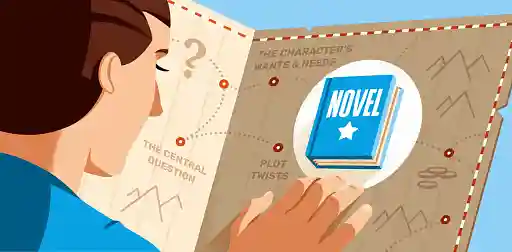
Need to plot your novel? Follow these 7 steps from New York Times bestselling author Caroline Leavitt.

Want to write your autobiography but aren’t sure where to start? This step-by-step guide will take you from opening lines to publishing it for everyone to read.

The climax is perhaps a story's most crucial moment, but many writers struggle to stick the landing. Let's see what makes for a great story climax.
Join a community of over 1 million authors
Reedsy is more than just a blog. Become a member today to discover how we can help you publish a beautiful book.